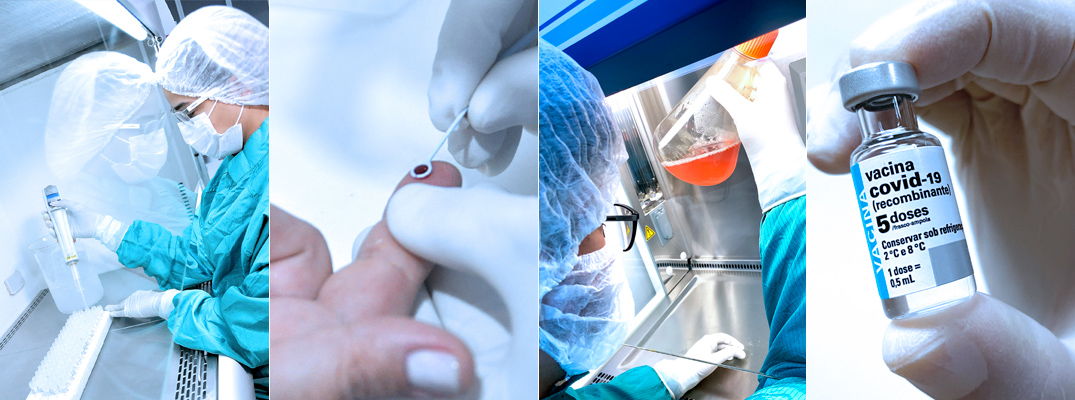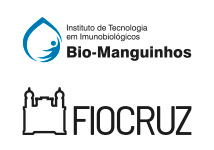
To support the actions of Fiocruz and the Ministry of Health in dealing with the Covid-19 pandemic, Bio-Manguinhos worked on different fronts, in a decisive way, even before the first case was identified in Brazil, still in 2020.
The Institute was responsible for important contributions that helped the country to fight the new coronavirus, such as:
February/2020 – With the first news of the emergence of the new coronavirus and its spread to other countries, Bio-Manguinhos develops, in about 40 days, with the collaboration of the IOC/Fiocruz, the molecular kit to detect SARS-CoV-2 . There were almost 13 million reactions provided to the Ministry of Health by December 2021.
April/2020 - To expand testing in the country, new diagnostic kits are made available, with different objectives. This month, Bio-Manguinhos obtained the registration of the POC DPP® Covid-19 IgM/IgG and, in July, of the POC Covid-19 IgM/IgG.
April/2020 – The exponential increase in the demand for tests led the Ministry of Health to request the support of Bio-Manguinhos in expanding the processing capacity of samples from patients with suspected Covid-19. To this end, two Diagnostic Support Units were initially implemented at its facilities, at the Henrique Penna Center.
Such support to the National Epidemiological Surveillance Network, including all Lacens and reference laboratories, continued in the following months, with the implementation of a total of 36 Diagnostic Support Units by the Institute, covering several states. To operate the new equipment, Bio-Manguinhos carried out training and offered technical assistance seven days a week to laboratory professionals.
September/2020 - Signing of the Technological Order Agreement with the biopharmaceutical company AstraZeneca. With this, the Institute guaranteed access to the Active Pharmaceutical Ingredient (API) of the recombinant vaccine, still under development, for final processing and quality control in its facilities, as well as the total transfer of technology. The choice of partnership was approved by the Ministry of Health, after extensive prospecting work.
January/2021 – Bio-Manguinhos receives authorization for emergency use of the Covid-19 vaccine from AstraZeneca/Oxford, imported from the Serum Institute, India. With this, the two million doses received are released to the Ministry of Health to accelerate vaccination in the states. On January 23, the first doses began to be applied in Brazil.
February/2021 – Arrival of the first batch of Active Pharmaceutical Ingredient (API), allowing the production of the first doses of the Covid-19 vaccine by Bio-Manguinhos, delivered in the following month to the Ministry of Health. Bio also became the pioneer in obtaining the registration of an immunizing agent against Covid-19 produced in Brazil.
April/2021 – In response to the Ministry of Health’s epidemiological surveillance demands, Bio-Manguinhos continued to present solutions to support the diagnosis of Covid-19 in the country. Three new POCs for the detection of SARS-CoV-2 virus antigens started to be provided, contributing to the autonomy of the public network: POC SARS-CoV-2 Ag; POC DPP® Covid-19 Ag; and POC Covid-19 Ag. The acronym Ag stands for antigen.
June/2021 – The technology transfer contract for the Covid-19 vaccine (recombinant) was signed with AstraZeneca, for the 100% nationalized production of the immunizer. The document formalizes the sharing of knowledge that was already being passed on by the technological partner to speed up the Brazilian production of the Active Pharmaceutical Ingredient (API). The transfer of technology is considered a milestone for ensuring national self-sufficiency in vaccine production.
Bio-Manguinhos receives the cell and virus banks for the production of the national API of the Covid-19 (recombinant) vaccine from AstraZeneca, marking the beginning of the second stage of the project for the technological incorporation, and advancing to its completely national production.
September/2021 – Bio-Manguinhos participated in a call for expressions of interest from PAHO/WHO and presented the mRNA vaccine project, being selected as a center for development, production and technology transfer of messenger RNA vaccines in Latin America. The choice of the unit occurred precisely due to the promising advances in its project.
November/2021 - Bio-Manguinhos submitted to the National Regulatory Agency (Anvisa) the request for a post-registration change of the Covid-19 vaccine (recombinant), requesting the inclusion of the Institute as a production unit of the Active Pharmaceutical Ingredient (API) of the immunizer.
The new Physical-Chemical Laboratory was inaugurated to meet the increased demand for quality control analyzes at the Institute, generated by the incorporation of the production of the Covid-19 vaccine (recombinant). The space has 1,362 m2, divided into two floors, being certified with the NB2 biosecurity degree. The lab has increased its quality control capability by 50%.
December/2021 – Bio-Manguinhos ends the year with more than 153 million doses of the Covid-19 vaccine (recombinant) delivered to the Brazilian National Immunization Program.
January/2022 – Anvisa authorizes Bio-Manguinhos to produce the 100% national Covid-19 (recombinant) vaccine. The first doses of this vaccine were applied in February.
As of the first week of May, a total of 26.4 million doses of the Covid-19 (recombinant) vaccine had been delivered in 2022.
In addition to the above initiatives, throughout the pandemic Bio-Manguinhos sought others in the field of technological development to offer new possibilities for protection against SARS-CoV-2 to the population. In partnership with Senai-Cetiqt, the Institute worked on a project for masks impregnated with antiviral compounds in functional textiles.
New molecular kits were registered in 2022 with Anvisa, with new options available to the Ministry of Health: Molecular Kit 4Plex SC2/VOC and Molecular Kit INFA/INFB/SC2. The first is a test for the detection of the SARS-CoV-2 virus and the screening of variants based on the identification of strains potentially important for public health and epidemiological surveillance in the country, designated by the World Health Organization (WHO) as VOCs that would be the alpha, beta, gamma, delta and omicron; the second detects specific genomic regions of influenza A, influenza B and SARS-CoV-2, being intended for in vitro diagnosis and epidemiological surveillance.


